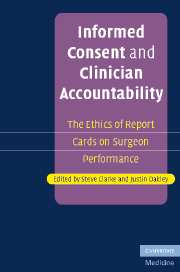Book contents
- Frontmatter
- Contents
- List of contributors
- Acknowledgements
- Introduction: Accountability, informed consent and clinician performance information
- Part I Accountability
- Part II Informed consent
- Part III Reporting performance information
- Part introduction
- 13 Is the reporting of an individual surgeon's clinical performance doing more harm than good for patient care?
- 14 Examining the link between publicly reporting healthcare quality and quality improvement
- 15 Hospital and clinician performance data: what it can and cannot tell us
- 16 An ethical analysis of the defensive surgery objection to individual surgeon report cards
- 17 Surgeon report cards and the concept of defensive medicine
- 18 Training, innovation and surgeons' report cards
- 19 Doctors' report cards: a legal perspective
- Index
- References
16 - An ethical analysis of the defensive surgery objection to individual surgeon report cards
Published online by Cambridge University Press: 08 August 2009
- Frontmatter
- Contents
- List of contributors
- Acknowledgements
- Introduction: Accountability, informed consent and clinician performance information
- Part I Accountability
- Part II Informed consent
- Part III Reporting performance information
- Part introduction
- 13 Is the reporting of an individual surgeon's clinical performance doing more harm than good for patient care?
- 14 Examining the link between publicly reporting healthcare quality and quality improvement
- 15 Hospital and clinician performance data: what it can and cannot tell us
- 16 An ethical analysis of the defensive surgery objection to individual surgeon report cards
- 17 Surgeon report cards and the concept of defensive medicine
- 18 Training, innovation and surgeons' report cards
- 19 Doctors' report cards: a legal perspective
- Index
- References
Summary
The public reporting of individual surgeon performance information encounters a variety of objections, from medical, economic and ethical perspectives. The most common ethical argument against publicizing surgeon-specific performance data is that the use of individual surgeon report cards leads surgeons to avoid operating on high-risk patients, because these patients are more likely to have unsuccessful outcomes, and such outcomes would have a negative impact on the surgeon's report card. In their discussion of report cards in the US, Green and Wintfeld (1995) write that:
Anecdotal reports suggest that some surgeons may have declined to operate on severely ill patients for fear that to do so could have lowered their standing in the mortality report.
(p. 1230)The former President of the UK Society of Cardiothoracic Surgeons, Bruce Keogh made a similar comment in relation to the introduction of surgeon report cards in the UK:
We … are concerned that publishing data could lead to the practice of defensive surgery, where high-risk cases are avoided. Surgeons have already begun to avoid high-risk cases.
(Keogh, quoted in Vass 2002, p. 189)And these comments are echoed by the President of the Royal Australasian College of Surgeons, Dr Russell Stitz:
In the United States, the surgeons are practising defensive medicine, because the surgeons are now avoiding the more difficult cases if they're exposed to public risk. … [A]s soon as you actually expose surgeons to public risk, they're going to change their practice, and that's the sad thing, because then the patient suffers.
[ABC Radio, The Health Report, 27/9/04]- Type
- Chapter
- Information
- Informed Consent and Clinician AccountabilityThe Ethics of Report Cards on Surgeon Performance, pp. 243 - 254Publisher: Cambridge University PressPrint publication year: 2007
References
- 1
- Cited by



